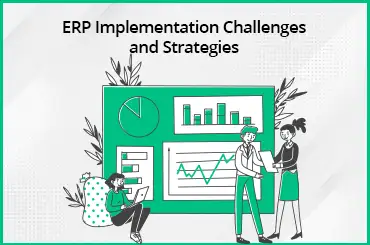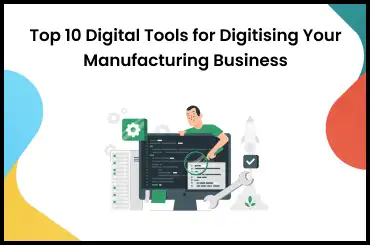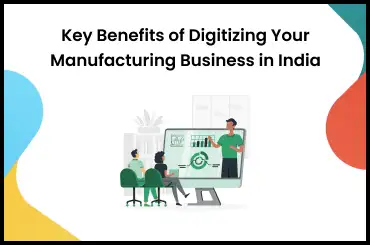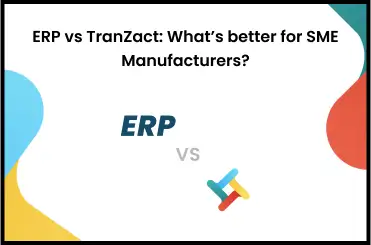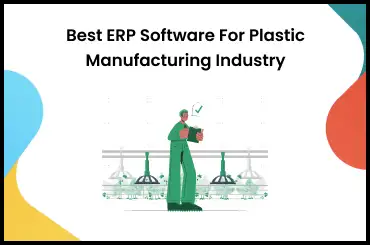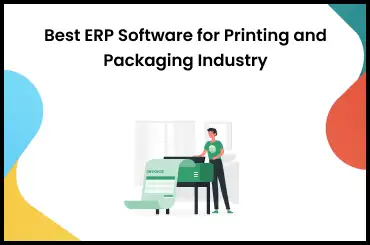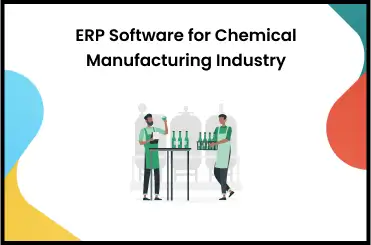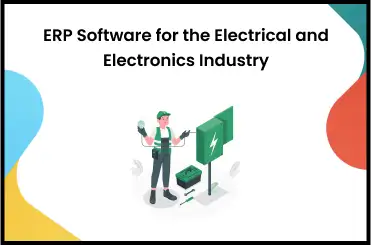Enterprise Resource Planning or ERP software is a popular software used by businesses to plan and organize end-to-end operations. The best ERP software for manufacturers can easily automate purchases, manufacturing, sales, production, inventory and other similar processes.
A free ERP software is not only cost-saving, but also contributes to productivity, transparency and greater enterprise control.
Best Free ERP Software In India
A free ERP system by vendors usually means that they are commercially accessible tools with base features, and trimmed-down versions of enterprise editions.
Read ahead to know more about the best free ERP software in India with all the basic ERP functionalities for your organization.
1. TranZact:
Tranzact is built specifically for SME manufacturing businesses, and provides a powerful solution to manage your inventory, purchase, sales, and production operations.
It interconnects all these workflows on a simple interface, combined with data-driven insights for manufacturing companies.
Features:
-
As part of its free forever plan, TranZact offers all its base features for an unlimited free period, at no extra cost.
-
With TranZact you can generate real-time reports on inventory data, transactions and other modules easily.
-
Preserving confidentiality while operating digitally is a crucial task. You can be assured about data security with TranZact as it offers 100% data security, being hosted on the trusted and secure AWS web services.
-
TranZact offers coherent team collaboration to drive business efficiency, along with easy GST-compliant documentation solutions and workflow management.
-
All documents created on TranZact can be instantly shared on WhatsApp & Emails.
-
The system records all historic transactions for future reference, allows posting of comments and tagging of team members easily.
-
It also sends an email notification to the team members for easy review and collaboration over the documents.
Pros:
-
TranZact offers inventory management solutions to help with minimum or maximum stock level analysis.
-
It also offers features such as real-time inventory valuation, negative stock tracking, barcoding, auto stock adjustment, and more.
-
You can digitize the handling of sales and purchase orders, quotations, e-way bills, goods received notes, challan, invoices and many other documents.
-
With TranZact's manufacturing ERP software solutions, you can plan and streamline production planning and procedures with TranZact, to eliminate downtime.
-
TranZact's production modules also enable cost-cutting with the help of multilevel Bill of Material, BOM costing, process routing and other features.
-
You do not need any expert technical assistance to operate this software as it's very easy to use.
-
Moreover, TranZact offers dedicated customer support to help its users with all their queries and implementation.
2. Dynamics NAV:
It's a tool that helps organizations gain complete control over core business procedures and customizes their ERP solutions.
Features:
-
Dynamics NAV helps to contain costs and maintains visibility of cash flow.
-
It offers relevant data retrieving and recommendations.
-
It helps to sharpen production, schedule shipment, cut down inventory costs and more.
Pros:
-
It is equipped with internal development resources that can be integrated into existing business procedures and IT.
-
It's ideal for midsize and large enterprises, providing insights to employees for improved performance.
Cons:
-
Not suitable for SMEs.
-
Total cost ownership of the advanced management system is high.
3. Axelor:
It is a customizable and flexible open-source ERP solution with several integrated business applications.
Features:
-
With Axelor you can access many accounting tools.
-
It collects financial data from all modules of business and combines it into the required ledgers, statements or portfolios.
-
It provides effective CRM support and business process management.
-
It simplifies invoicing when it comes to managing multiple clients.
Pros:
-
It offers a hybrid platform for process-oriented and integrated business applications.
-
It supports business process optimization and configuration.
Cons:
- Constant upgradation can be problematic and time-consuming for existing customers.
4. Blueseer:
Blueseer is an ERP platform alternative to high-cost commercial ERPs, for MSMEs and SMEs.
Features:
-
It helps with inventory tracking, human resource management and warehouse management.
-
It offers standard costing, purchasing and sales management solutions.
-
It offers a customizable fit to diverse management needs.
Pros:
-
It is multilingual, free and open-source.
-
It is customizable to fit your needs.
-
Does not require keys, or registration to start off with.
Cons:
- Not available on Android and iOS.
5. Dolibarr:
Dolibarr is a web-based CRM and ERP open-source software for SMEs, large companies, and individual proprietors.
Features:
-
Dolibarr offers Sales CRM software to keep track of sales and purchases.
-
It supports human relationship management, finance and billing operations.
-
Enables auto stock management with calculation of weighted average price, along with the margins module to review financial data.
Pros:
-
You can enable only the features you require from any device.
-
It's available on all platforms, on-premise, or as a SaaS application.
Cons:
-
The SQL structure of the tool comes with a language barrier.
-
The accounting tool of the software has limitations.
What is Enterprise Resource Planning (ERP) software?
Enterprise resource planning software is a software for organizations to manage day-to-day activities like procurement, transactions, production, accounting, inventory management, and other operations.
By integrating these business functions, an ERP software enables seamless data flow between departments and sources, to plan, predict and report important operational information.
Therefore, by collecting the company's shared transactional data and ensuring centralized data integrity using ERP systems, a business can eliminate data duplication and erroneous activities.
An ERP tool provides enhanced transparency into your enterprise by tracking all production, accounting and inventory activities in real time. All authorized management personnel of the same company can access end-to-end workflows and data through the integrated ERP system.
Key Features Of ERP Software
The important features of an ERP software are as follows:
-
An ERP provides centralized data sharing and automation across the enterprise for diverse functions.
-
It offers data analysis and reporting functions that help to optimize data, spot fraud and reduce costs.
-
You can track real-time data, break down data silos and analyze business operations for increased visibility.
-
An ERP offers streamlined customer relationship management by storing and sharing customer experience databases in an organized way.
-
With automated functions and data insights enabled by an ERP tool, SMEs can also maximize marketing campaign efforts and drive more leads.
-
A free ERP software for inventory management can be used to track and manage stocks, and inventories on a large scale for SMEs.
Different Modules In ERP System
Each ERP module is suited for specific business functions, while offering accurate information over a single management platform.
Let's understand more about the different ERP modules as follows:
1. Inventory Management:
Inventory or stock management module within a manufacturing ERP system, automates all inventory operations for the business. It supports automated inventory tracking, analysis, cost management and control.
It enables management of inward and outward inventory movements with ease, supporting you to handle precise item location and quantities.
2. Warehouse Management:
It maximizes warehouse visibility across multiple stores to increase inventory capacity. With real-time warehouse activity monitoring, staff members can oversee different categories of stock easily.
This helps them to plan production, material planning and shipments accurately, depending on the order volume. A warehouse management tool may be a separate module in an ERP or integrated within the inventory module.
3. Order Management:
It tracks all processes related to managing orders including order receipt, processing, execution and delivery. It also includes dispatching and tracking orders to the warehouse, retail store, and distribution center after the order is ready.
How order management is embedded within an ERP tool depends on the software design. Sometimes it may be interconnected within a transactions module, or linked with the inventory module.
4. Procurement:
This module helps secure all resources including raw materials, semi-finished goods and equipment needed for finished goods production. In some ERP systems, procurement is interlinked with the purchases and material requirements planning or MRP module.
5. Production:
This module enables automated management of all production related operations including production planning, management, routing, sub-contracting, scheduling and testing functions.
It also includes bill of material management, to know product manufacturing costs and material usage for every production cycle.
Other important modules within an ERP software are accounting and finance, customer relationship management and vendor management modules. An ERP may also include human resource management and logistics modules.
Types of ERP Systems
Based on their unique characteristics, ERP types can be classified into the following:
1. Box ERP:
It is straightforward and ready to install, but cannot be customized or configured easily. They can be used immediately for business functions, but these ERPs do not allow add-ons and are ridged boxed. However, they are relatively cost-effective for small businesses.
2. Large scale/Complex ERPs:
These ERP systems are custom-made from a framework provided by the company. Since developers have to start from scratch, these ERPs require a lot of time to develop and consult before delivering the specialized product.
3. Intermediate/Flexible ERPs:
These ERP systems can be categorized between boxed and large-scale ERP systems. They offer great flexibility and are customizable to fit your needs. They're also cost-effective and an ideal ERP software for a small manufacturing company.
4. Industry-specific ERPs:
These systems offer specific features but lack configuration capabilities. The software is easy to use due to familiar terminologies but has customization limitations.
Benefits Of ERP Software
The key business benefits of the best ERP software for small business in India are as follows:
1. Real-time business reporting:
A cloud-based ERP platform provides real-time information with the help of automated reporting tools and a centralized database for all business procedures.
It connects various departments with each other, enabling live, data-driven decisions and instant visual insights.
2. Boosted operations:
An ERP software enables businesses to streamline overall business processes and reduce production bottlenecks. It ensures lean and effective inventory, production system and demand forecasting.
SME business owners can implement smarter workflows and enjoy increased transparency, automation and control. Therefore, an ERP provides businesses with boosted operations and improved competitive advantage.
3. Revenue increase & cost saving:
Improved procurement, inventory and production management contribute to decreased delays and losses. ERP tools ensure that you only carry necessary inventory, reducing your overhead costs, while optimizing inventory processes to match customer delivery time.
Due to automated processes with modernized ERP tools, businesses can save more costs. In addition, enhanced vendor management helps SMEs to automate their vendor follow-ups leading to minimized order losses, and increased revenue.
4. Faster growth:
With flexible and adaptable business operations that are well-monitored always, SME businesses can focus on strategic decisions, revenue growth and faster scalability.
Automated inventory and production processes improve working capital ratios month on month, leading to reduced operational costs.
5. Exceptional customer service:
In addition to streamlining internal manufacturing processes, ERP software also supports improving customer relationships. It ensures on-time order delivery, faster response rates and improved order quality.
By providing access to all customer-related information, an ERP tool enables improved issues redressal and service delivery. By enhancing internal efficiencies, ERP maximizes customer experiences exponentially leading to more customer demand and revenue.
6. High data security:
A cloud-based ERP software provides dedicated security infrastructure and secure data distribution across web servers. SMEs can be assured about their data over the cloud, as it provides expert data encryption and prevents physical loss of data.
What Are the Challenges Faced While Implementing an ERP System?
Implementation of an ERP System comes with certain challenges, or rather important factors that must be considered before implementation:
ERP cost:
ERP costs may be a challenge for some SMEs if they haven't found the right ERP software in their budget. ERP costs include implementation costs, third-party software add-ons, customization costs, and maintenance costs.
In addition, based on the modules and number of users required in an ERP, also the costs can rise.
Complex migration processes:
The most important factor while adopting an ERP, is the implementation and data migration strategy. If this is not finalized in the right manner before implementation, the migration process can turn out to be complex and time-consuming. Bad data conversion may also lead to increased costs and delays.
Training:
It's very important for everyone in the organization to understand all the features of the ERP software, and how it impacts operations. If a business adopts a complex ERP, it may require intensive technical training sessions for the staff, which may also lead to high training costs.
Flexibility limitations:
Based on the type of ERP, the software may or may not be flexible to the organization's growing requirements. Limitations on this front can be challenging for SMEs to operate on the ERPs.
How to Choose an ERP Software?
Choosing the best ERP software for manufacturing in India, that overcomes potential challenges is no mean feat. But you can begin by creating a dedicated ERP project, which outlines your principal requirements from an ERP software.
Next, you must identify the modules and functions in your business that must benefit from an ERP implementation and determine the metrics for the same. Your team must also understand the total cost of ownership, including all related costs and charges when looking for a free ERP software for small business.
Based on your internal goals, you can then proceed to looking for an ERP software that meets all your requirements, fits your budget, offers a free trial and is flexible to your future growth plans.
ERP & More? Think TranZact!
In the above blog, we have tried to provide you a comprehensive idea about the best ERP software in India and all the features about ERP software systems. In addition to all the essential modules of an ERP, TranZact offers key integrations with business platforms like Tally, Excel and Aftership to ensure you can digitize and scale faster. It also ensures you're never worried about manual dependencies anymore!
TranZact is a cloud-based business automation and manufacturing management system that offers all ERP solutions, but is quintessentially more powerful than any ERP software. If you're looking for the best online ERP software in India and more, try TranZact without any doubts as it offers a free unlimited trial with all its base features.
You can upgrade to the paid features only when you're fully assured of the value that TranZact brings to your business!
FAQs on Free ERP Software
1. Which is the best free ERP software for manufacturers?
If you're looking for the best ERP software for manufacturing industry, TranZact is the one for you. It provides you with powerful solutions for all your manufacturing-related problems at one place.
It digitizes your inventory, purchase, sales, and production operations with ease. It provides all base features across different modules for an unlimited free period. It also provides real-time reports and data-driven, smart business dashboards, with instant documentation solutions.
95% of users have said that TranZact is very easy to use and offers the best customer support.
2. Is there a free ERP?
Yes, TranZact offers a free trial for ERP solutions that are specifically designed for SME manufacturers. It offers all its base features for free, for an unlimited period. When users have explored TranZact adequately, they can choose to shift to the advanced features, only when they're fully sure of how valuable TranZact can be for their SME.








